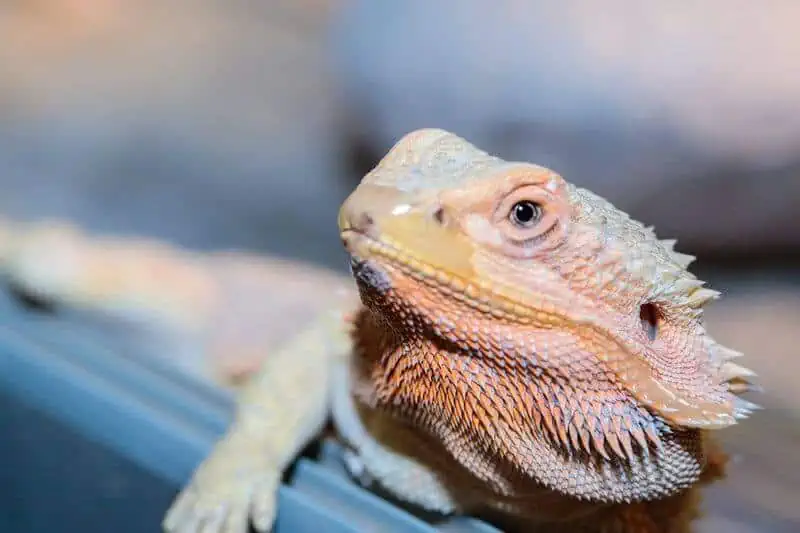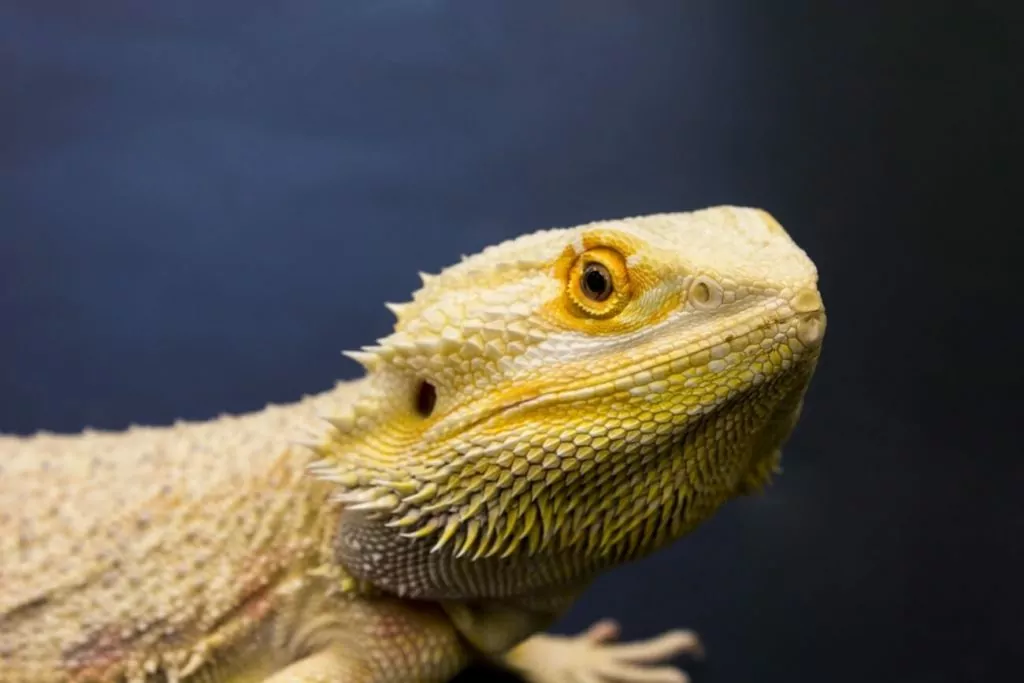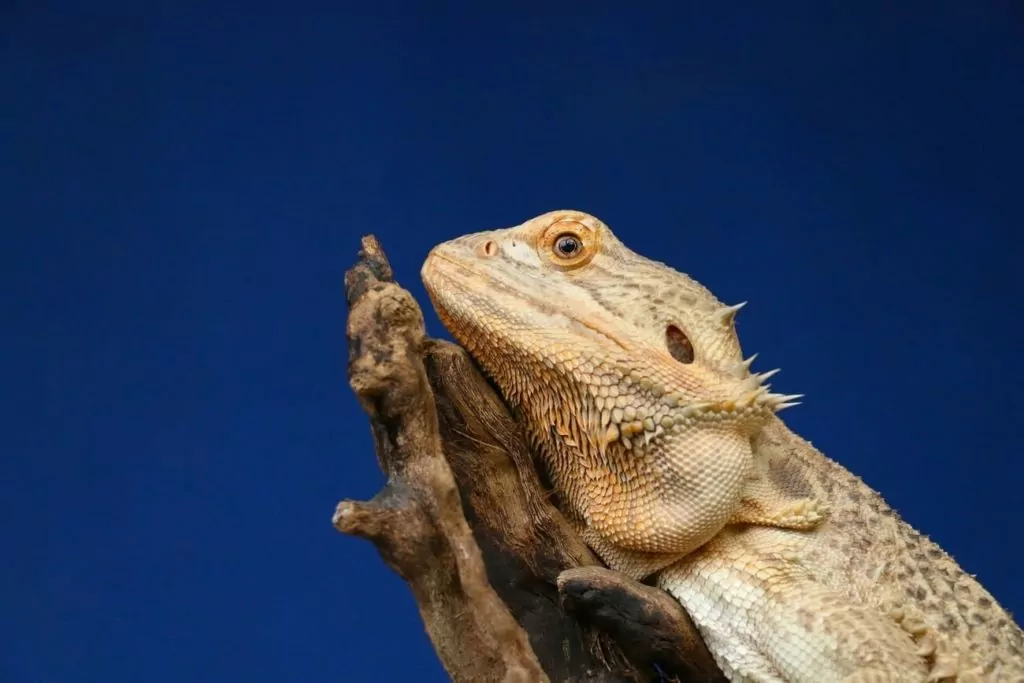Trying to figure out why your bearded dragon is shaking can be scary and confusing. But in reality, knowing a handful of common causes can often help you quickly diagnose the problem.
This guide covers everything you need to know.
Table of Contents
1. Not Enough Calcium
A calcium deficiency is one of the most common causes of unexpected shaking in bearded dragons. These lizards need calcium to stay healthy. It plays a critical role in bone health. Calcium deficiencies are referred to as hypocalcemia.
Unfortunately, many captive beardies don’t get enough calcium in their diet. Without a calcium-rich diet, the bones can become soft and brittle. That increases the lizard’s risks of fractures and bone deformities.
The shaking is usually a sign that your bearded dragon is weak. The bones cannot support the reptile’s weight, causing the arms and legs to buckle. It could also be calcium-related muscle tremors. Other possible symptoms include noticeable lethargy, constipation, and odd twitching.
The most common cause of hypocalcemia is an improper diet.
Feeding bearded dragons calcium supplements is paramount. You must dust the insects you provide in calcium powder to ensure your beardie gets this crucial mineral.
To prepare meals, gut-load insects prior to feeding. Then, toss the insects and the powder into a bag or plastic container. Give the container a good shake to coat the bugs, and they’re good to go.
Another solution to prevent shaking is to ensure that you’re using UVB light. It helps the reptile make Vitamin D3, which is necessary for calcium absorption.
2. Insufficient Lighting
Incorrect lighting can also cause a major problem for bearded dragons. It goes beyond UVB lighting. While that can play a big part in your beardie’s shaking, the problem may stem from issues with the standard lighting system and temperature.
Contrary to popular belief, bearded dragons are not nocturnal. They’re diurnal creatures that are most active during the day. If you don’t have a system that recreates a standard day-night cycle, health problems will arise.
These lizards need full-spectrum lighting for around 12 hours per day. But that’s not all. There must be a temperature gradient.
One side of the tank needs a hotter basking lamp with temperatures between 95 and 110 degrees Fahrenheit. On the cooler end, ideal ambient temperatures are about 75 degrees.
A lack of proper lighting will make it difficult for your bearded dragon to thermoregulate. They need areas of warmth and cool to control their body temperatures.
As mentioned earlier, UVB lighting is important, too. You can’t see UVB light, but your lizard benefits from its presence. Make sure to keep the UVB lamp on the same timer as your standard lights, and replace the bulb every six months.
Improper lighting creates many health issues. In addition to causing shaking, it can result in constipation. Some lizards also go into a quasi-hibernation mode if temperatures drop too low.
3. Metabolic Bone Disease
We’ve touched on metabolic bone disease, but it’s a debilitating disease that deserves special attention. Shaking is one of the first symptoms of this disease, so you must take action as quickly as possible.
This awful disease affects your lizard’s skeletal system. It’s typically a byproduct of calcium deficiencies, so it’s entirely avoidable. However, most novice reptile enthusiasts aren’t aware of how common it is.
Simple mistakes like a lack of UVB lighting and calcium supplements can cause these lizards to suffer.
When the disease takes hold, the bones soften. They become brittle enough to break and can develop deformities. You may even notice the shape of your beardie’s skull changes as the bones in the jaw become vulnerable to damage.
When caring for a bearded dragon, the most important thing is to provide a proper diet and environment that helps the lizard avoid painful metabolic bone disease.
Dust every insect you provide with calcium powder. You can also offer calcium-rich greens like kale or dandelion leaves. Don’t forget to gut-load your insects, too. Gut-loading the bugs with calcium-rich foods will make it easier for your bearded dragon to take advantage of all the vitamins and minerals the insects consume before feeding.
Feel free to speak with a vet specializing in reptile care if you need clarification about how much calcium your lizard gets.
Also, stay on top of the UVB light you install. Because you can’t see the light it produces, you may not realize that the bulb no longer works. Replace it frequently (every six months) to avoid any period without UVB exposure.
4. Stress
Bearded dragons might be simple creatures, but they’re fully capable of feeling stressed. When their anxiety levels rise, your pet can exhibit many odd behaviors. Shaking is one of them.
You may also see them actively avoiding food or spending more time hiding under shelter. Some will even go into a frenzy, making you question the reptile’s quality of life.
There are many potential causes of stress. In most cases, it’s all related to the environment. Depending on the beardie’s size, you might need a bigger enclosure than you currently use.
It’s a common mistake that newer bearded dragon owners make. They assume these lizards don’t need much room to roam. As a result, they keep them in cramped quarters.
Bearded dragons can grow up to 24 inches long. Furthermore, they love to climb and explore. If you’re keeping your lizard in a tank that’s too small, it will start to feel the effects of stress.
Consider doing more to give your beardie a better quality of life. You can upgrade the enclosure, provide more hide boxes in their habitat to make them feel safe, and outfit the enclosure with climbing branches for physical activity. Don’t be afraid to get creative with the decor to simulate the lizard’s natural environment better.
The more time you put into the tank, the happier your bearded dragon will be.
5. Vitamin Poisoning Or Vitamin Deficiency
Vitamins play a big part in your bearded dragon’s health. As an owner, your job is to ensure your pet gets what it needs from its diet. However, there’s a fine balance.
A few different issues can creep up based on your bearded dragon’s needs.
Deficiencies are a common concern. Shakes can come from a lack of Vitamin D3 and Vitamin B.
Vitamin D3 is essential for calcium absorption. It’s a snowball effect. Without Vitamin D3, your lizard can’t utilize the calcium in its diet to keep the bones strong and healthy. As a result, they might develop metabolic bone disease.
The body creates this vitamin naturally, but beardies need UVB light to synthesize it properly. That’s why providing UVB exposure is critical. You can give Vitamin D3 supplements, but you must be careful about going overboard.
Many reptile enthusiasts fear metabolic bone disease so much that they offer too much D3. When that happens, you run the risk of vitamin toxicity.
A Vitamin D3 overdose can cause extreme joint pain. It may also get into the heart and kidneys, resulting in major health issues. To avoid toxicity, limit D3 supplements to about once per week. Alternatively, you can let a good UVB light array do the work for you.
Many beardies also need more Vitamin B. There are many B vitamins that your lizard needs. These include B1, B12, folic acid, and biotin.
Vitamin B deficiencies can cause shaking, blindness, and egg binding. Fortunately, multivitamin supplements and powders are available to address the issue.
You have to be careful with supplements. Working with a vet to determine how much you need to provide and when is a good idea. While it’s good to go the extra mile, some reptile enthusiasts offer far too much.
Excess vitamins can lead to toxicity, like the Vitamin D3 issues mentioned earlier. In addition to D3 toxicity, bearded dragons can suffer from Vitamin A toxicity.
Vitamin A overdoses can cause skin ulcers, tremors, and other health problems. Make sure to read the instructions provided with multivitamin supplements and consult with a vet.
6. Neurological Condition
Unfortunately, neurological conditions can also result in your bearded dragon shaking. In these cases, the movements are involuntary and likely linked to deeper health problems. For example, symptoms can arise due to central nervous system infection, brain lesions, muscle diseases, and more.
There are many potential causes. Some bearded dragons encounter neurological diseases due to vitamin toxicity. Others have these problems because of bad genetics. It all depends on the situation.
If your bearded dragon is shaking and you suspect that this is the cause, you should take them to your vet for proper diagnosis and treatment.
7. Parasites
Parasitic infections are more common than most reptile enthusiasts realize. They can invade the reptile’s enclosure, entering the system and wreaking havoc on your lizard’s health.
Shaking is a serious symptom of parasites, so you need to visit a vet as soon as possible. Several parasitic organisms can take hold, but pinworms are one of the worst offenders.
Luckily, parasites are relatively easy for vets to treat. However, you must know when to spot the signs and bring them to a vet before the problem causes life-threatening trouble.
Conclusion
Determining why your bearded dragon is shaking is easier than it seems, and it’s often due to one of the causes above.
However, you should never hesitate to take your pet to your veterinarian if you’re unsure or want an expert opinion and diagnosis. Your little beardie is worth it!



